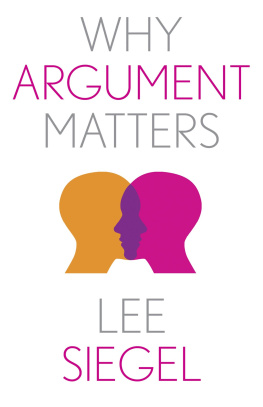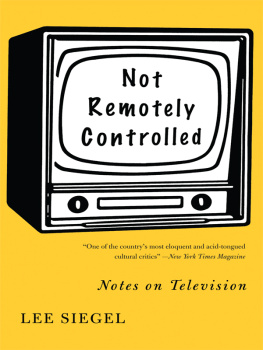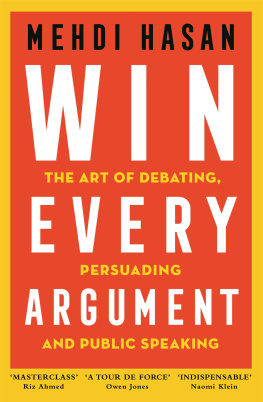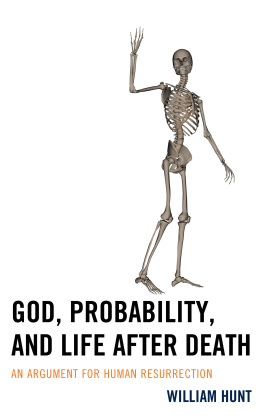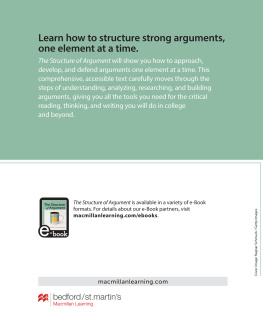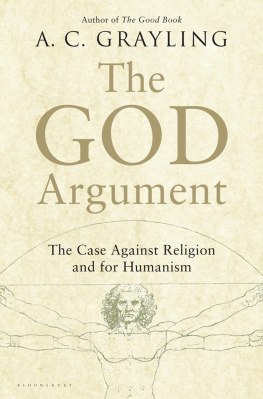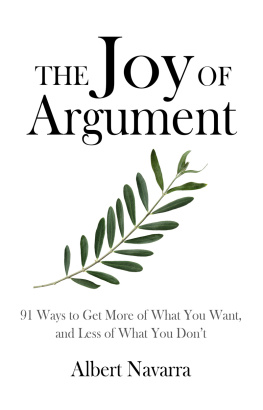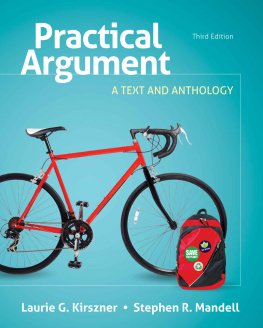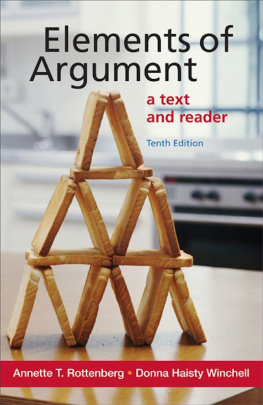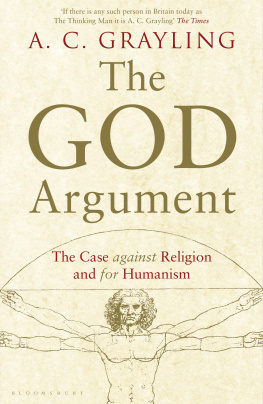why argument matters
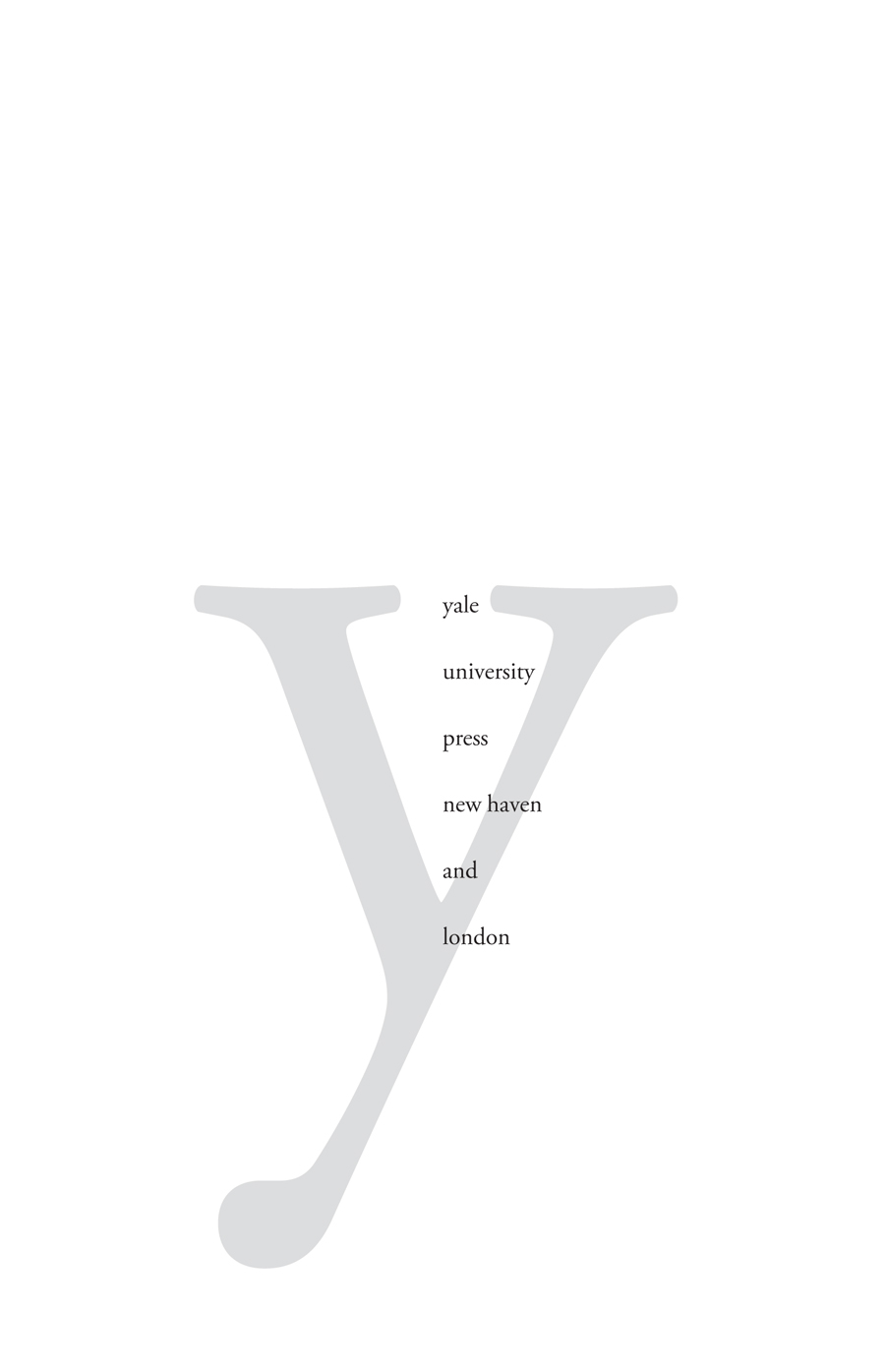

Why X Matters is a registered trademark of Yale University.
Copyright 2022 by Lee Siegel.
All rights reserved.
This book may not be reproduced, in whole or in part, including illustrations, in any form (beyond that copying permitted by Sections 107 and 108 of the U.S. Copyright Law and except by reviewers for the public press), without written permission from the publishers.
Yale University Press books may be purchased in quantity for educational, business, or promotional use. For information, please e-mail (U.K. office).
Set in Adobe Garamond type by IDS Infotech Ltd.
Printed in the United States of America.
Library of Congress Control Number: 2021941205
ISBN 978-0-300-24426-7 (hardcover : alk. paper)
A catalogue record for this book is available from the British Library.
This paper meets the requirements of ANSI/NISO
Z39.48-1992 (Permanence of Paper).
10 9 8 7 6 5 4 3 2 1
also by lee siegel
Falling Upwards: Essays in Defense of the Imagination
Not Remotely Controlled: Notes on Television
Against the Machine: Being Human in the Age of the Electronic Mob
Are You Serious? How to Be True and Get Real in the Age of Silly
Groucho Marx: The Comedy of Existence
The Draw: A Memoir
For Julian and Harper
contents
why argument matters
prologue
Many useful books have been written about how to win an argumentin court, in school, at work and at play, in a retail situation, in a parking lot kerfuffle, in the bedroom, in 280 characters. What all these different types of disagreement have in common is that they are transactional: an exchange of words results in either gain or loss. This book, however, aims to offer a practical usefulness based on a higher aspiration. It is about arguments roots in our very existence, argument that is as natural and inevitable a condition of our being as breathing: Dum spiro arguo. I am interested in argument as the expression of a universal longing for a better life.
Though I will certainly encompass arguments that occur between adversaries, the arguments that I have in mind are not wranglings over one position or another. They are justifications for ways of living. Such arguments do not require the presence of an opponent. The adversary on these occasions is not a person but a social, cultural, or political condition. The most powerful and memorable arguments are made in a speech, a treatise, an essay, a critiqueMartin Luther Kings I Have a Dream speech, Edmund Burkes Vindication of Natural Society, Ren Descartess Discourse on Method, George Orwells Politics and the English Language, Virginia Woolfs A Room of Ones Own. These make argument, contrary to the popular conception of it as a gregarious undertaking, the product of solitude, like art, or like any type of profound contemplation. It is my hope that part of this books usefulness will be to add another resource to the readers solitude.
The books first part, The Art of Argument, explores argument as a categorical challenge to the status quo that seeks to modify, amplify, or replace one set of givens with another. Here argument can appeal to the emotions, it can employ subtlety and nuance, but it is always a categorical statement about existence. Its most powerful tactic, however, has little to do with logic and rhetoric.
A true argument depends upon two qualities: an intense concern for the matter at hand that extends beyond merely winning or losing the argument, and the ability to live the thoughts and emotions behind the counterargument. The most relentless, intellectually merciless arguments are acts of caring about the worldagain, persuasion as the vision of a better lifewith a grasp of your opponents inwardness as the instrument of mastery.
Such imaginative inhabitation of an opponent has two purposes. One is to know your opponents mind the more completely to dismantleor discredit, or even destroyhis argument. The other is to know your opponents mind in order to join with him in a common humanity, regardless of the arguments outcome. And in the event that the sincere embodiment of a common humanity within the structure of an argument helps you to carry the day, then so much the better.
The second part of the book, The Argument of Art, explores art as an argument for the dignity of human existence itself. If a work of art, by getting closer to what is real, can reproduce human existence in all its multiplicity of truth, then art proves that life can be created out of the imagination just as surely as out of a biological cell. A successful work of art makes the argument that humanity can transcend its material conditions.
To put it another way, argument seeks to make one approach to life prevail over another for the sake of a larger and freer existence; art strives to convince us of the multifaceted nature of existence for the sake of a larger and freer argument. Like Penelope besieged by the suitors, truth is as wily as it is contested.
Let us be clear about what true argument, the art of argument, is not. It is not a quarrel. It is not a dispute. It is not a debate. Although I will sometimes use these words in place of argument for the sake of variation, elegant or otherwise, argument possesses a different meaning.
A quarrel is a disagreement inflamed by the ego.
A dispute is a disagreement restrained by the law.
A debate is a disagreement organized by the spirit of play.
A quarrel serves no purpose. It is set in motion when an individuals aggrieved self-interest runs up against another individuals aggrieved self-interest. Like those perpetually swinging metal balls known as Newtons cradle that used to adorn the desks of male business executives before the metaphorical image of colliding testicles lost its masculine allure, quarrels never end because the ego never rests.
No logic, evidence, or language will convince either my wife or me that it is the others turn to unload the dishwasher this morning. Lacking the qualities of logic, evidence, and language, an argument cannot take place. A quarrel is an attempt to reposition the ego within the acreage created and shared by two or more egos. Since the acreage is a psychic abstraction, a quarrel does not follow rational lines.
A dispute contests impersonal boundaries. If my neighbor has just spent thousands of dollars on a new set of backyard LED lights and I complain that the lights are shining through my bedroom window, each of us will make a mental estimation of our legal rights.
Now should the quarrel between my wife and me about emptying the dishwasher lead to the process of divorce, then the quarrel would become a dispute, and the law would decide who gets our nice European dishwasher.
And if my neighbor and I decide that one of us has been not just unfairly imposed upon but personally insulted, then what should have been a dispute will simmer and seethe into a quarrelunless we avoid interacting with each other. A quarrel requires a travesty of intimacy to be maintained.
A debate is free from the anger of a quarrel and from the looming process of a dispute. However, its freedom from feeling or formal redress makes it seek its own structure. A debate is a detached ritual of disagreement.
Though often used interchangeably with these other terms, a true argument stands apart from them.
Argument flows from our intuitive certainty that our right to exist is the most elemental truth, and that our right to exist is bound up with our freedom to think about existence in specific ways. These are abstractions that we hope will become real, either through subtlety and irony or through earnest declamation and attack. Argument is hope, sometimes at the chessboard and sometimes in the boxing ring.
Next page
